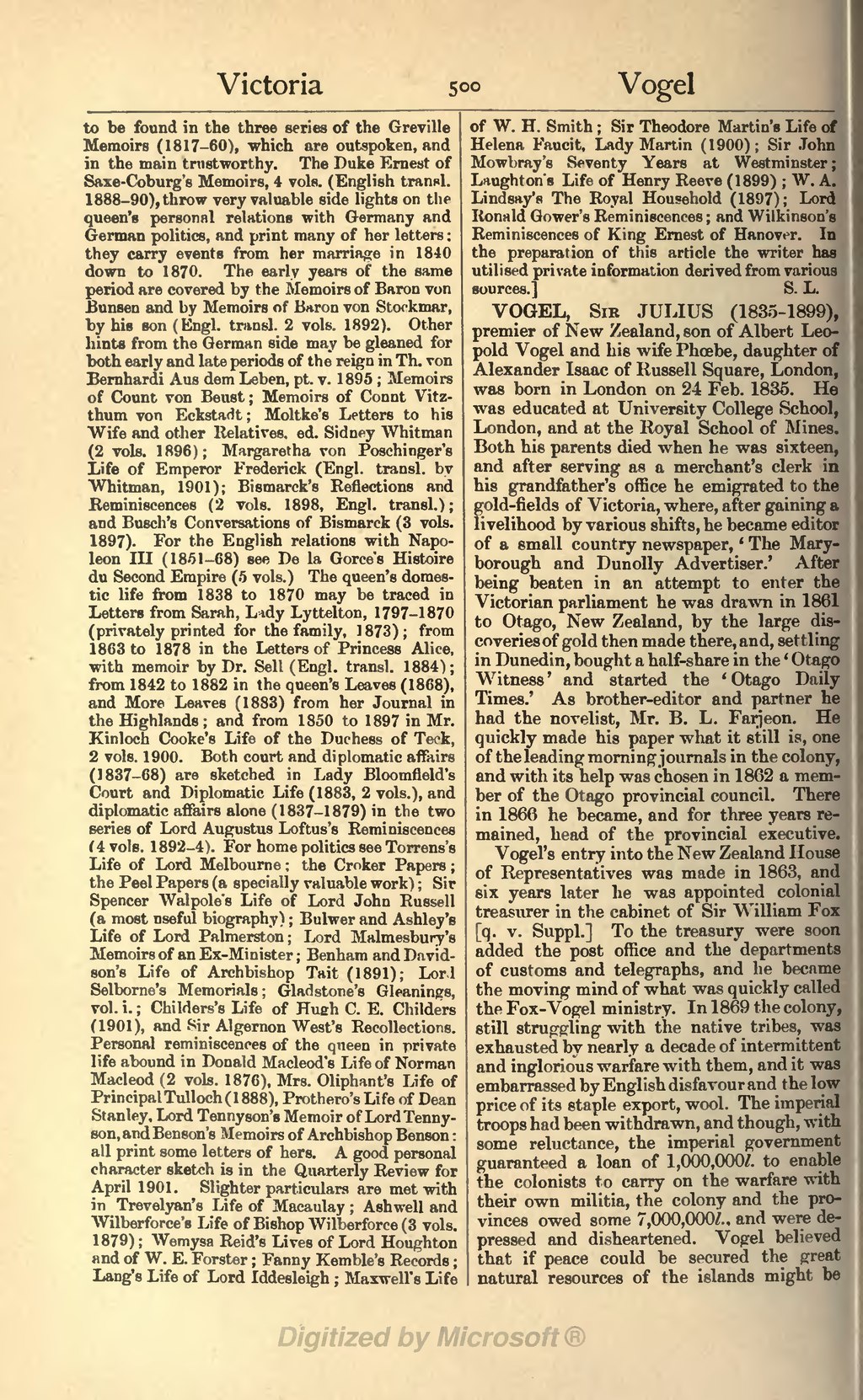to be found in the three series of the Greville Memoirs (1817-60), which are outspoken, and in the main trustworthy. The Duke Ernest of Saxe-Coburg's Memoirs, 4 vols. (English transl. 1888-90), throw very valuable side lights on the queen's personal relations with Germany and German politics, and print many of her letters; they carry events from her marriage in 1840 down to 1870. The early years of the same period are covered by the Memoirs of Baron von Bunsen and by Memoirs of Baron von Stoekmar, by his son (Engl. transl. 2 vols. 1892). Other hints from the German side may be gleaned for both early and late periods of the reign in Th. von Bernhardi Aus dem Leben, pt. v. 1895; Memoirs of Count von Beust; Memoirs of Count Vitzthum von Eckstadt; Moltke's Letters to his Wife and other Relatives, ed. Sidney Whitman (2 vols. 1896); Margaretha von Poschinger's Life of Emperor Frederick (Engl. transl. by Whitman, 1901); Bismarck's Reflections and Reminiscences (2 vols. 1898, Engl. transl.); and Busch's Conversations of Bismarck (3 vols. 1897). For the English relations with Napoleon III (18-51-68) see De la Gorce's Histoire du Second Empire (5 vols.) The queen's domestic life from 1838 to 1870 may be traced in Letters from Sarah, Lady Lyttelton, 1797-1870 (privately printed for the family, 1873); from 1863 to 1878 in the Letters of Princess Alice, with memoir by Dr. Sell (Engl. transl. 1884); from 1842 to 1882 in the queen's Leaves (1868), and More Leaves (1883) from her Journal in the Highlands; and from 1850 to 1897 in Mr. Kinloch Cooke's Life of the Duchess of Teek, 2 vols. 1900. Both court and diplomatic affairs (1837-68) are sketched in Lady Bloomfield's Court and Diplomatic Life (1883, 2 vols.), and diplomatic affairs alone (1837-1879) in the two series of Lord Augustus Loftus's Reminiscences (4 vols. 1892-4). For home politics see Torrens's Life of Lord Melbourne; the Croker Papers; the Peel Papers (a specially valuable work); Sir Spencer Walpole's Life of Lord John Russell (a most useful biography); Bulwer and Ashley's Life of Lord Palmerston; Lord Malmesbury's Memoirs of an Ex-Minister; Benham and Davidson's Life of Archbishop Tait (1891); Lori Selborne's Memorials; Gladstone's Gleanings, vol. i.; Childers's Life of Hugh C. E. Childers (1901), and Sir Algernon West's Recollections. Personal reminiscences of the queen in private life abound in Donald Macleod's Life of Norman Macleod (2 vols. 1876), Mrs. Oliphant's Life of Principal Tulloch (1888), Proth ero's Life of Dean Stanley, Lord Tennyson's Memoir of Lord Tennyson, and Benson's Memoirs of Archbishop Benson : all print some letters of hers. A good personal character sketch is in the Quarterly Review for April 1901. Slighter particulars are met with in Trevelyan's Life of Macaulay; Ashwell and Wilberforce's Life of Bishop Wilberforce (3 vols. 1879); Wemyss Reid's Lives of Lord Houghton and of W. E. Forster; Fanny Kemble's Records; Lang's Life of Lord Iddesleigh; Maxwell's Life of W. H. Smith Sir Theodore Martin's Life of Helena Faucit, Lady Martin (1900); Sir John Mowbray's Seventy Years at Westminster; Laughton's Life of Henry Reeve (1899); W. A. Lindsay's The Royal Household (1897); Lord Ronald Gower's Reminiscences; and Wilkinson's Reminiscences of King Ernest of Hanover. In the preparation of this article the writer has utilised private information derived from various sources.]
VOGEL, Sir JULIUS (1835–1899), premier of New Zealand, son of Albert Leopold Vogel and his wife Phoebe, daughter of Alexander Isaac of Russell Square, London, was born in London on 24 Feb. 1835. He was educated at University College School, London, and at the Royal School of Mines. Both his parents died when he was sixteen, and after serving as a merchant's clerk in his grandfather's office he emigrated to the gold-fields of Victoria, where, after gaining a livelihood by various shifts, he became editor of a small country newspaper, 'The Maryborough and Dunolly Advertiser.' After being beaten in an attempt to enter the Victorian parliament he was drawn in 1861 to Otago, New Zealand, by the large discoveries of gold then made there, and, settling in Dunedin, bought a half-share in the 'Otago Witness' and started the 'Otago Daily Times.' As brother-editor and partner he had the novelist, Mr. B. L. Farjeon. He quickly made his paper what it still is, one of the leading morning journals in the colony, and with its help was chosen in 1862 a member of the Otago provincial council. There in 1866 he became, and for three years remained, head of the provincial executive.
Vogel's entry into the New Zealand House of Representatives was made in 1863, and six years later he was appointed colonial treasurer in the cabinet of Sir William Fox [q. v. Suppl.] To the treasury were soon added the post office and the departments of customs and telegraphs, and he became the moving mind of what was quickly called the Fox-Vogel ministry. In 1869 the colony, still struggling with the native tribes, was exhausted by nearly a decade of intermittent and inglorious warfare with them, and it was embarrassed by English disfavour and the low price of its staple export, wool. The imperial troops had been withdrawn, and though, with some reluctance, the imperial government guaranteed a loan of 1,000,000l. to enable the colonists to carry on the warfare with their own militia, the colony and the provinces owed some 7,000,000l., and were depressed and disheartened. Vogel believed that if peace could be secured the great natural resources of the islands might
